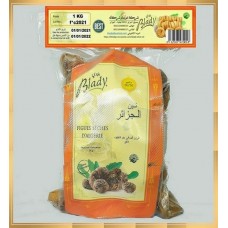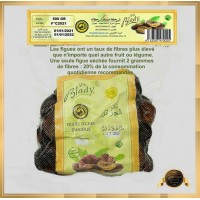Nutritional
value of dried fig(100g)
Calories (kcal)
-249 * Fiber (g) -10 * Fat (g) -1 * Protein (g) -3 * Sugar (g) -48 Vitamin A (IU) -10 * Vitamin C (mg) -1.2 * Vitamin
B1-0.1 * Vitamin B2-0.1 Vitamin B6-0.1 * Sodium-10 *
Potassium-680 * Calcium-162 * Phosphorus-67 Magnesium-68 *
Iron-3.07 * Manganese-0.8 * Copper-0.3 * Selenium-0.6 * Zinc-0.5
• Caliber: 60/76
• Packaging: Vacuum bag 1kg
• Season: 2021/2022
• Variety:
Thaamriouth
• Place of
production: Seddouk
| Dread Figs | |
| Dried Figs | The virtues of the fig Several prospective and epidemiological studies have observed that high consumption of figs decreases the risk of cardiovascular disease, certain cancers and other chronic diseases. Some mechanisms of action have been proposed to explain this protective effect; the presence of antioxidants in figs may play a role. Antioxidants. Antioxidants are compounds that protect cells in the body from damage caused by free radicals. The latter are believed to be involved in the development of cardiovascular diseases, certain cancers and other diseases linked to aging. The antioxidant content (flavonoids and phenolic compounds) and antioxidant capacity of dark-colored figs (eg the Mission variety) are said to be higher than those of lighter-colored fig varieties, according to the results of a study. Most of the antioxidant compounds are found in the peel of figs, which is usually eaten. Consuming dried figs (40 g or about 4 figs) significantly increases antioxidant capacity. In addition, the dried fig is distinguished by its content in various nutrients (including fiber, potassium, calcium and iron) higher than that of cranberries, dates, raisins and dried plums. Calcium. The dried fig is a source of calcium. Calcium is by far the most abundant mineral in the body. It helps build bones and teeth, as well as maintain their health. Calcium also plays an essential role in blood clotting, maintaining blood pressure and muscle contraction (including the heart). Magnesium. Dried figs are a source of magnesium for adults, while fresh figs are a source of magnesium only for women, with higher magnesium requirements in men. Magnesium is involved in bone development, protein building, enzymatic actions, muscle contraction, dental health and the functioning of the immune system. It also plays a role in energy metabolism and in the transmission of nerve impulses. Potassium. Dried fig is a source of potassium. In the body, it is used to balance the pH of the blood and to stimulate the production of hydrochloric acid in the stomach, thus supporting digestion. In addition, it facilitates the contraction of muscles, including the heart, and participates in the transmission of nerve impulses. Iron. Dried fig is a source of iron only for men, as iron requirements are higher for women. This mineral is essential for the transport of oxygen and for the formation of red blood cells in the blood. It also plays a role in making new cells, hormones and neurotransmitters (messengers in nerve impulses). Manganese. Both fresh and dried figs are sources of manganese. Manganese acts as a cofactor of several enzymes that facilitate a dozen different metabolic processes. It also participates in the prevention of damage caused by free radicals. Copper. Both fresh and dried figs are sources of copper. As a component of several enzymes, copper is necessary for the formation of hemoglobin and collagen (a protein used for the structure and repair of tissues) in the body. Several copper-containing enzymes also help in the body's defense against free radicals. Source Vitamin B1. The fresh fig is a source of vitamin B1. Also known as thiamine, vitamin B1 is part of a coenzyme necessary for the production of energy mainly from the carbohydrates that we ingest. It is also involved in the transmission of nerve impulses and promotes normal growth. Pantothenic acid. The fresh fig is a source of pantothenic acid. Also known as vitamin B5, pantothenic acid is part of a key coenzyme that allows us to adequately use the energy from the food we eat. It is also involved in several stages of the synthesis (manufacture) of steroid hormones, neurotransmitters (messengers in nerve impulses) and hemoglobin. Vitamin B6. The fresh fig is a source of vitamin B6. Vitamin B6, also called pyridoxine, is part of coenzymes involved in the metabolism of proteins and fatty acids as well as in the manufacture of neurotransmitters (messengers in nerve impulses). It also helps in the production of red blood cells and allows them to carry more oxygen. Pyridoxine is also necessary for the conversion of glycogen into glucose and it contributes to the proper functioning of the immune system. Finally, this vitamin plays a role in the formation of certain components of nerve cells. Vitamin A. Dried fig is a source of vitamin A, in the form of beta-carotene. Vitamin A is one of the most versatile vitamins, playing a role in many body functions. It contributes, among other things, to the growth of bones and teeth. It keeps the skin healthy and protects against infections. In addition, it has antioxidant properties and promotes good vision, especially in the dark. Vitamin K. Dried fig is a source of vitamin K for adults, while fresh fig is a source of vitamin K only for women, with a higher vitamin K requirement in men. Vitamin K is needed for the production of proteins that help blood to clot (both stimulate and inhibit blood clotting). It also plays a role in the formation of bones. In addition to being found in food, vitamin K is made by bacteria in the gut, which is why vitamin K is rare. Dietary fibers Figs, whether fresh or dried, are a source of dietary fiber. They contain about 30% soluble fiber and 70% insoluble fiber. In general, a diet high in fiber is associated with a lower risk of colon cancer. Eating a diet high in soluble fiber can help normalize blood levels of cholesterol, glucose and insulin, which may help in the treatment of cardiovascular disease and type 2 diabetes. As for a diet rich in insoluble fiber, it helps to maintain adequate bowel function. |
Dried Figs Supra
- Brand: Blady
- Product Code: Dried Figs Supra 50/65 1kg
- Reward Points: 100
- Availability: In Stock
-
1,200DZD
- Ex Tax: 1,200DZD
- Price in reward points: 400
Related Products
Dried Fig Extra
Nutritional value of dried fig(100g)Calories (kcal) -249 * Fiber (g) -10 * Fat (g) -1 * Protein (g) ..
500DZD Ex Tax: 500DZD
Dried Fig Std
Nutritional value of dried fig(100g)Calories (kcal) -249 * Fiber (g) -10 * Fat (g) -1 * Protein (g) ..
1,190DZD Ex Tax: 1,000DZD
Dried Fig Extra
Nutritional value of dried fig (100g)Calories (kcal) -249 * Fiber (g) -10 * Fat (g) -1 * Protein (g)..
1,200DZD Ex Tax: 1,200DZD
Tags: dried fig, organic products, health products






















